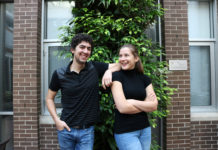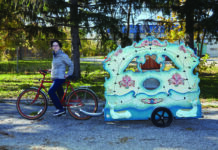Waterloo city council has announced plans to potentially redesign Waterloo Park’s Eby Farmstead or replace it with a new attraction, sparking a city-wide consultation. Mayor Dorothy McCabe turns to residents and students to gather feedback on the future of this beloved park area.
“We don’t know necessarily that we’re going to replace the animal displays. That’s part of the open discussion,” McCabe said. “I’m really interested in hearing from the people who live in the community, including students – they’re a big part of our community.”
Mayor McCabe outlined the feedback plan, beginning with an online forum for feedback and continuing with in-person consultations in June and July. “I’m expecting at the end of September we will have a report back from staff summarizing what people have been saying in the consultation. From that point, we will make a decision to keep it open or repurpose it into something else,” McCabe said.
Waterloo Park is a vital part of the community and several students have expressed their fondness for the farmstead. “It’s a great place to connect with the community and spend some time with myself. It’s very pretty, I love the animals,” said Olivia Rolston, a science student at UW.
However, it doesn’t mean the farmstead is without its faults. “I do think the animal enclosures could be improved. The llamas and donkeys look not very happy and their enclosures are so small,” said Rolston. “If the animal displays were to be replaced I think that space would have great potential for something that everyone can enjoy and to bring people together.”
Although, some long-term residents have fond memories of the farmstead and may not be ready to let it go. “As a little kid I used to really like the animals,” said Sean Barret, a UW psychology student who grew up in Waterloo. McCabe added, “Some people really enjoy taking their kids there and it provides some of Waterloo’s agricultural history.”
The consultation will not only consider keeping or changing the farmstead but also explore potential improvements and their associated costs. “Do we keep it? Do we close it? Do we improve it? And if we want to improve it, we have to figure out how much it costs,” said McCabe. Eby Farmstead currently houses llamas, an alpaca, donkeys, ponies, and occasionally goats. It costs $75,000 annually to maintain the farmstead.
Mayor McCabe also raised concerns about the impact of the GRT ION streetcar, which passes by the farmstead every ten minutes, having a negative impact on the animals’ well-being. “There was no concept of the GRT when the farmstead was first created. So what does that do for the animals? Is that good for them?” McCabe said. Researchers state that visitors and loud noise can cause pain, fear, cognitive problems, and a negative welfare impact on confined animals.
McCabe emphasized the importance of community feedback on the Eby Farmstead: “It’s really important for us to take the time to listen.” The future of Eby Farmstead is up to you. If you have feedback or suggestions on what that future should be, go to www.engagewr.ca/eby-farmstead.





























